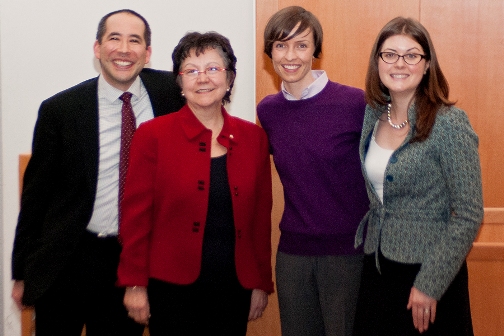
Media
Better access to justice in Canada? There's an app for that
The Globe and Mail, June 13, 2016Online
If a police officer stops you on the street and tells you to produce identification, do you know your rights? If not, do you know where to go to find out what they are? A smartphone app called Legalswipe is providing a novel way to quickly and inexpensively answer these questions. Developed by recent University of Ottawa law-school graduate Christien Levien, the app provides real-time information about legal rights during interactions with police. It will even provide specific language for responding to police queries in a variety of circumstances. Legalswipe proved so popular that its servers crashed under the demand when it launched last July.
Survival Sex in Peacekeeping Economies: Re-Reading the Zero Tolerance Approach to Sexual Exploitation and Sexual Abuse in United Nations Peace Support Operations
Published by Journal of International Peacekeeping
2014 This paper investigates the zero tolerance policy on sexual exploitation and sexual abuse by United Nations peacekeepers as it relates to survival sex in peacekeeping economies. Understanding the policy as a form of discursive power, the analysis seeks to reveal the effects of zero tolerance by asking: what is obscured about survival sex in peacekeeping economies when it is viewed through the lens of zero tolerance, and to whose benefit? The argument is that zero tolerance is a poor policy framework to address peacekeeper engagement in survival sex because it fails to grapple with the complex set of economic circumstances that give rise to survival sex decision-making by girls and women in peacekeeping economies. In light of the failure of zero tolerance, a rights-based approach to survival sex in peacekeeping economies represents a more promising means of addressing the issue to the benefit of local girls and women.
URL: http://papers.ssrn.com/sol3/papers.cfm?abstract_id=2456759
SOGI...So What? Sexual Orientation, Gender Identity and Human Rights Discourse at the United Nations
Published by Canadian Journal of Human Rights
2014 This paper presents a critical appraisal of the “term of inclusion” by which issues related to sexual and gender diversity are being incorporated into international human rights discourse at the United Nations (UN): the category “sexual orientation and gender identity” or SOGI. The analysis maps the evolution of SOGI in the UN context and highlights three potential risks of a human rights discourse built on SOGI in the international context: 1) the marginalization of trans people, gender expression and intersex people in rights discourse; 2) the entrenchment of Western-based identity categories that lack applicability across contexts; and 3) the simple addition of SOGI to existing human rights discourses, resulting in fragmented and unpredictable norms related to sexual and gender diversity. The paper concludes that in the same moment that we celebrate the progress made by SOGI in advancing human rights related to sexual and gender diversity, we must continue to engage the potential risks and unintended consequences of relying on SOGI to ground international human rights discourse.
URL: http://papers.ssrn.com/sol3/papers.cfm?abstract_id=2503665
Now it's my rights versus yours: Equality in tension with religious freedom
Published by Alberta Law Review
2016 This article focuses on cases involving the equality rights of gay, lesbian, bisexual, and queer people in tension with the religious freedoms of faith-based communities that denounce gay, lesbian, bisexual, and queer identities and same-sex intimacy. Part II focuses on the idea of rights in tension and considers the jurisprudence of competing rights, as well as the existing legal framework for reconciling conflicting Charter rights. Part III considers four appellate level religion-equality cases from the past 15 years. Part IV discusses the conflict of rights in these cases and their future implications.
URL: http://www.albertalawreview.com/index.php/alr/article/view/457
Developments in Constitutional Law: The 2013 Term
Published by Supreme Court Law Review
2015 This paper reviews four important constitutional law decisions issued by the Supreme Court of Canada in 2013: the division of powers opinion in Marine Services International Ltd. v. Ryan Estate, and three sizable decisions concerning the Canadian Charter of Rights and Freedoms outside the criminal procedure context: Saskatchewan (Human Rights Commission) v. Whatcott; Quebec (Attorney General) v. A; and Canada (Attorney General) v. Bedford. Individually, each of the cases advances a particular body of jurisprudence and raises interesting questions about prospective directions for the federalism doctrines and Charter rights at stake. Read together, the cases also suggest some noteworthy themes relevant to the future of constitutional law jurisprudence more broadly, offering insights on the limits of the doctrine of stare decisis; the role of choice in Charter cases; and the Court's continuing intention to nudge the balance of federalism toward the provinces.
URL: http://papers.ssrn.com/sol3/papers.cfm?abstract_id=2563540&download=yes
'What Have You Done for Me Lately?' Reflections on Redeeming Privacy for Battered Women
Published by Oxford University Press
2009 Based largely on privacy's ongoing use to justify nonintervention in situations of domestic violence, many feminists have rejected privacy as antithetical to women's equality. This chapter revisits the feminist rejection of privacy in the context of domestic violence by re-conceptualizing woman abuse as implicating women's privacy interests: physical, sexual and emotional abuse clearly infringe a woman's right to be "let alone" as against her battering partner, and violate her right to create boundaries between herself and others. State nonintervention and police reluctance to enforce protection orders in the name of privacy must then be seen as privileging a man's right to be "let alone" from state interference over a woman's right to be "let alone" from a battering partner. Understood as a situation of competing privacy interests, a battered woman may require quantitatively more privacy as against an abusive partner and qualitatively more effective means to create and enforce those privacy boundaries to ensure her physical and emotional safety. The paper concludes that privacy should be reinvigorated as a tool in the fight against domestic abuse.
URL: http://papers.ssrn.com/sol3/papers.cfm?abstract_id=2182703
Biography
Jena McGill’s research centers on human rights and equality in both the domestic and international contexts, and particularly on questions related to gender, sexuality and the law. She joined the Faculty of Law as an Assistant Professor in 2011 and has served as a law clerk to Madam Justice Louise Charron at the Supreme Court of Canada. McGill also worked at the United Nations International Law Commission in Geneva, Switzerland, and then completed her graduate studies in law (LL.M.) at Yale Law School, where she focused on constitutional law, human rights and equality issues related to gender, sexuality and the law. Her research centers on human rights and equality in both the domestic and international contexts, and particularly on questions related to gender, sexuality and the law. She has researched and published on topics including sexual exploitation and abuse in United Nations peacekeeping operations; constitutional privacy rights under section 8 of the Charter; Canadian prison policy and the UN Convention on the Elimination of All Forms of Discrimination Against Women (CEDAW); and the Supreme Court of Canada’s equality jurisprudence under section 15 of the Charter. McGill serves as the Faculty Liaison for the joint J.D./M.A. program and teaches Tort Law and Constitutional Law I in the first year program, as well as an upper-year seminar on Gender, Sexuality and the Law.


